Climate change: Biggest global poll supports 'global emergency'
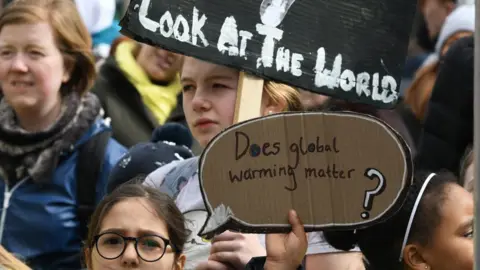 Getty Images
Getty ImagesDespite the pandemic, almost two thirds of people around the world now view climate change as a global emergency.
That's the key finding from the largest opinion poll yet conducted on tackling global warming.
More than a million people in 50 countries took part in the survey, with almost half the participants aged between 14 and 18.
Conserving forests and land emerged as the most popular solution for tackling the issue.
So who has taken part?
The poll, called the "People's Climate Vote", has been organised by the United Nations Development Programme in conjunction with Oxford University.
The organisers distributed poll questions through adverts in mobile gaming apps across 50 countries, between October and December last year.
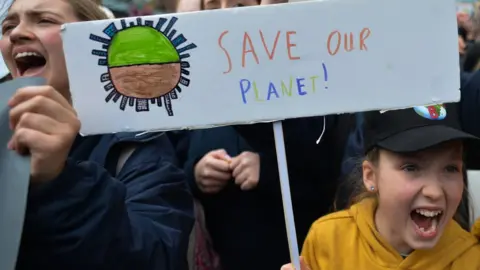 NurPhoto
NurPhotoAround 1.22 million people of all genders, ages, and educational backgrounds took part, but with significant numbers of younger people.
Some 550,000 people aged 14-18 took part.
What were the key findings?
Across all countries, 64% of participants saw climate change as an emergency, requiring urgent responses from countries. The margin of error was +/- 2%.
This result varied somewhat by age and location.
In the UK and Italy, 81% agreed with the question, while this dropped to 50% among those responding from Moldova.
Newly installed US President Joe Biden can take some comfort that 65% of those in the US taking part now view climate change as an emergency.
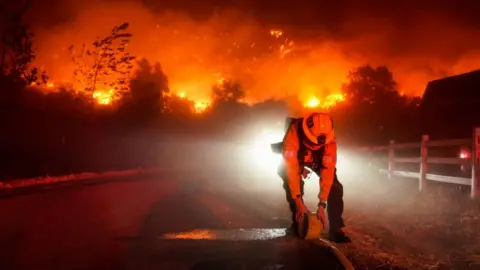 Getty Images
Getty ImagesOverall, younger people were more likely to agree with the view that rising temperatures were an emergency, with nearly 70% in favour.
For people over the age of 60, this dropped to 58%.
"People are scared, they are seeing the the wildfires in Australia and California, they're seeing the category five storms and in the Caribbean, they are seeing flooding in in Southeast Asia," said Cassie Flynn, strategic adviser to the UNDP.
"And they're looking around them and they're saying, this is a real problem. We have to do something about this."
Most popular policies
The actions that people tend to favour when it comes to tackling climate change depend, to some extent, on where people live.
In eight of the 10 countries with the highest emissions from generating electricity, there were majorities in favour of using more green energy.
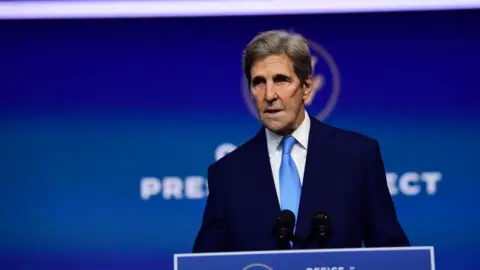 Getty Images
Getty ImagesBut in countries with bigger emissions from deforestation and land use changes, there was majority support for conserving forests and land.
This emerged from the overall survey as the most popular policy for dealing with climate change, by a narrow margin.

Top four policies to tackle climate change:
- Conserve forests and land (54%)
- Use solar, wind and renewable power (53%)
- Climate friendly farming techniques(52%)
- Investing more money in green businesses and jobs (50%).

The least-favoured options for tackling climate change in this survey were a plant-based diet, with only 30% of respondents believing it to be the best.
Germany, with 44%, and the UK, with 43%, were the countries where plant-based diets received the strongest support.
The authors say that across all countries, remarkably few people declined to support any policy.
Pakistan emerged as the country with the greatest number of people not favouring any policy, at 5%.
It was followed by the United States, with 4%.
Underlying differences
One of the key differences that emerged in the data was the level of education.
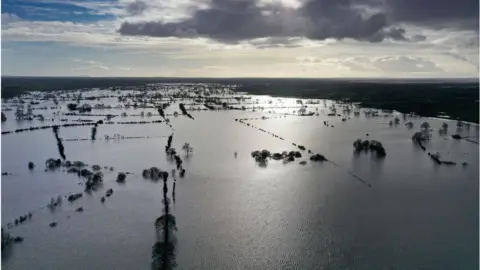 Getty Images
Getty Images"When it comes to demographics, something that we saw very clearly was that there is a high correlation between a level of education and belief in the climate emergency. The more educated you are, the more likely you are to believe that there is a climate emergency," said Cassie Flynn.
"And this is really, really powerful, because it doesn't matter where you're from, it doesn't matter your age, education really, really is important."
What about gender differences?
While the overall findings show roughly the same responses from men and women, there were quite pronounced differences at the country level.
In Canada, women and girls were 12% more likely to say that climate change is an emergency than men and boys.
The US, UK and Australia had smaller differences in the same direction.
In contrast, India, Georgia, Vietnam and Nigeria went in the opposite direction, with men and boys being 9-12% more likely to say that warming is an emergency.
What does this mean for politics?
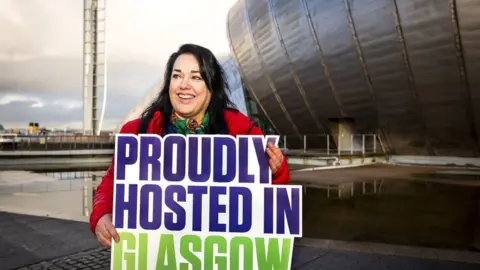 Getty Images
Getty ImagesWith a new president in the White House who is making climate change a priority, and with a key global conference taking place in Glasgow later this year, the organisers of the poll believe that it is an important time for world leaders to hear a wide range of voices on climate change.
"How they respond to the climate crisis, how they respond to the Covid crisis, is really going to chart an entirely new pathway. And so in many ways, it is this moment of choice," said Cassie Flynn from UNDP.
"And what we wanted to do with the people's climate vote is to bring people's voices to that decision making, to bring people's voices to the climate debate."
Follow Matt on Twitter.
